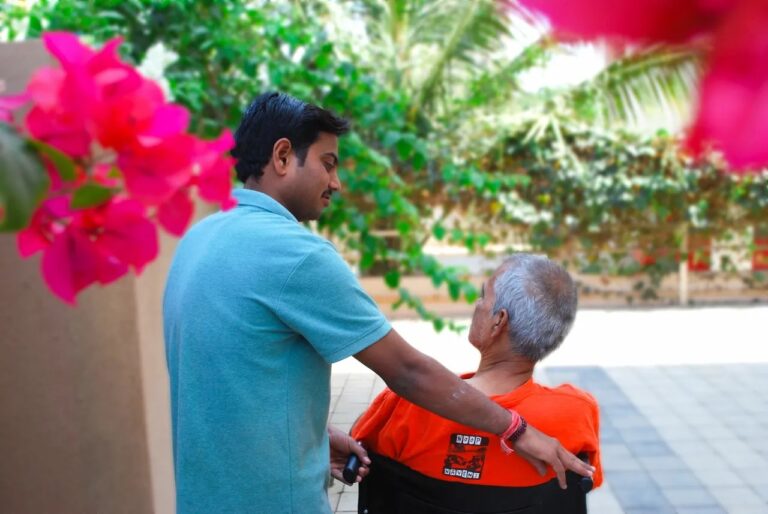Dementia Care In Pune
Dementia isn’t a single sickness, it means trouble remembering stuff or thinking clearly that gets in the way of normal tasks. Alzheimer’s disease is the most common form of dementia. Even though most people with dementia are older, it’s not a usual part of getting old. When dementia is caused by bad disease or accidents, it won’t go away. But in some cases when its cause is drugs like alcohol and not enough vitamins, hormones or happiness – called depression – then things might get back to normal again.

Dementia Care Center
Signs & Symptoms
Dementia affects each person in a different way, depending upon the impact of the disease and the person’s personality before becoming ill. The signs and symptoms linked to dementia can be understood in three stages.
Earlier stage: the early stage of dementia is often overlooked because the onset is gradual. Common symptoms include:
- forgetfulness
- losing track of the time
- becoming lost in familiar places.
Moderate Stage: as dementia progresses to the middle stage, the signs and symptoms become clearer and more restricting. These include:
- becoming forgetful of recent events and people’s names
- becoming lost at home
- having increasing difficulty with communication
- needing help with personal care
- experiencing behavior changes, including wandering and repeated questioning.
Late Stage: the late stage of dementia is one of near-total dependence and inactivity. Memory disturbances are serious and the physical signs and symptoms become more obvious. Symptoms include:
- becoming unaware of the time and place
- having difficulty recognizing relatives and friends
- having an increasing need for assisted self-care
- having difficulty walking
- experiencing behavior changes that may escalate and include aggression.
Diagnosis
Doctors will check how well you think. There are many tests that check how well you think, like your memory and direction. They also measure your ability to reason and make decisions correctly. These tests can look at language skills too as well as paying attention carefully.
Doctors check your memory, language skills, how you see things and pay attention. They look at problem-solving abilities and bodily movement too. This includes checking senses such as touch taste smell sound sense of stable body balance speed reaction reflexes etc. A physical test, blood tests and brain scans like a CT or MRI can help.
Types Of Dementia
Alzheimer’s disease: This is the main reason for dementia, found in 60 to 80 percent of cases. It happens because of certain alterations in the brain. The main sign is having trouble remembering things that happened recently like a talk you had just minutes or hours ago. Later in the disease, it gets hard to remember old memories too. Other issues like trouble with walking or talking, or changes in personality appear later on.
Family background is the top risk factor. If a close family member gets Alzheimer’s disease, your chance of getting it too rises by 10 to 30 percent.
Vascular dementia: About 10 percent of dementia cases happen because of strokes or problems with blood flow to the brain. Diabetes, high blood pressure and a lot of cholesterol are also things that can make you more likely to get heart disease. Symptoms change depending on which part of the brain and how big it is, that gets hit. The sickness moves in steps, so symptoms quickly get worse when someone has more strokes or small-strokes called “mini-strokes.”
Lewy body dementia: Along with normal signs like forgetfulness, those who have this type of dementia might also face movement or balance issues such as stiffness and shaking. A lot of folks also feel different levels of wakefulness. This can involve feeling sleepy during the day, having trouble with thoughts or being lost in staring spells. They might also have troubles sleeping at night or could see things that aren’t really there like people, objects and shapes.
Fronto-temporal dementia: This kind of forgetfulness usually brings about changes in personality and actions because it affects a part of the brain. People with this problem might feel ashamed or act badly in front of others. For example, a person who used to be careful might start saying mean things and stop doing their duties at home or work. There could also be issues with talking or grasping language.
Mixed dementia: Sometimes, more than one kind of mental decline can be in the brain at once. This mostly happens to people who are 80 years old or older. For instance, a person might have Alzheimer’s disease and dementia caused by blood vessels. You can’t always tell if someone has both kinds of dementia because the signs from one might be stronger or could look like another type. The growth of illness may be quicker than with just one type of dementia.
Reversible causes: People with dementia might have a fixable cause like medicine side effects, brain pressure increase, lack of vitamins or thyroid imbalance. Doctors should check for things that can be fixed in patients who might have memory problems.
Treatment:
The way to treat dementia depends on what’s causing it. There’s no cure for brain-wasting diseases like Alzheimer’s, though we have some drugs that can shield the mind or deal with problems such as sadness, sleep trouble, imagining things wrongly and fidgety behavior. Parkinson’s disease is one of these issues.
Doing regular exercise, eating good foods and having friends can help prevent long-term health problems. This may also lessen the chance of getting dementia.
Our skilled, nice team members are here to explain everything about the big Dementia care services we give. They also provide good honest advice and information without bias or favoritism.
FAQ
Swarnavihar Dementia Care is a specialized program designed to support individuals living with dementia. Our services include memory care, specialized staff training, and tailored activities.
Dementia Care at Swarnavihar is specifically designed to meet the unique needs of individuals with dementia. We provide a secure environment, specialized care plans, and activities that focus on cognitive stimulation and comfort.
We provide care and support for various forms of dementia, including Alzheimer’s disease, vascular dementia, Lewy body dementia, and other related conditions.
Our staff receives specialized training in dementia care, including understanding dementia behaviors, effective communication techniques, and strategies to create a supportive and safe environment.
Yes, we have a designated memory care unit with a secure and comfortable environment tailored to meet the needs of residents with dementia.
We offer activities that promote cognitive stimulation, such as memory-enhancing games, art therapy, music therapy, and sensory activities to improve the quality of life for our residents.
Our trained staff is equipped to handle challenging behaviors in a compassionate and understanding manner. We use evidence-based techniques to manage and reduce these behaviors.
We encourage family involvement and open communication. Family members are an integral part of the care team, and we provide support and resources for them.
Yes, our memory care unit is designed to prevent wandering, with secure access and outdoor spaces that are safe and monitored.
We provide access to qualified medical professionals who are experienced in dementia care. Our services include medication management, regular health assessments, and coordination with specialists as needed.
+91 70 71 72 80 61 / 62
Contact Us
Old age is the golden period of life, live a quality life
Enhancing the Golden Years: Contact Us for Quality Senior Living

